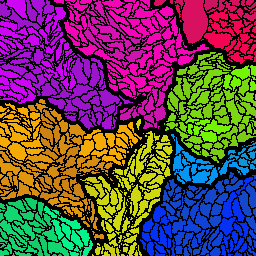Page Summary
-
The Watershed Boundary Dataset (WBD) provides a comprehensive collection of hydrologic unit data, defining the extent of surface water drainage.
-
WBD delineations follow science-based hydrologic principles and are represented as polygons with associated attributes like Hydrologic Unit Codes (HUCs), size, and name.
-
HUCs range from 2 to 12 digits, indicating different levels of detail for the hydrologic units, with higher digit counts representing smaller, nested areas.
-
The dataset is available for a specific one-day period in April 2017 and can be explored using Google Earth Engine.
-
USGS information, including this dataset, is generally in the public domain and can be used without restriction, though crediting is encouraged.

- Dataset Availability
- 2017-04-22T00:00:00Z–2017-04-23T00:00:00Z
- Dataset Producer
- United States Geological Survey
- Tags
Description
The Watershed Boundary Dataset (WBD) is a comprehensive aggregated collection of hydrologic unit (HU) data consistent with the national criteria for delineation and resolution. It defines the areal extent of surface water drainage to a point except in coastal or lake front areas where there could be multiple outlets as stated by the Federal Standards and Procedures for the National Watershed Boundary Dataset. Watershed boundaries are determined solely upon science-based hydrologic principles, not favoring any administrative boundaries or special projects, nor particular program or agency. The intent of defining HUs for the WBD is to establish a baseline drainage boundary framework, accounting for all land and surface areas.
The HUs are delineated at 1:24,000-scale in the conterminous United States, 1:25,000-scale in Hawaii and the Caribbean, and 1:63,360-scale in Alaska, meeting the National Map Accuracy Standards (NMAS). WBDs are represented as polygons that define the boundary of the HUs. The HUs are given a Hydrologic Unit Code (HUC) that ranges from 2 digits to 12 digits. These codes describe where the unit is in the country and the level of the unit. The number of digits in a HUC is related to 6 levels of detail for the WBD: the lower level polygons cover larger areas than higher level ones. The higher the level, the more digits to the HUC, since previous levels are nested in it.
The WBD polygons attributes include HUCs, size (in the form of acres and square kilometers), name, downstream HUC, type of watershed, non-contributing areas, and flow modifications. WBD line attributes contain the highest level of hydrologic unit for each boundary, line source information and flow modifications.
| Name | Level | Digit | HU Code |
|---|---|---|---|
| Region | 1 | 2 | 2 |
| Subregion | 2 | 4 | 4 |
| Basin | 3 | 6 | 6 |
| Subbasin | 4 | 8 | 8 |
| Watershed | 5 | 10 | 10 |
| Subwatershed | 6 | 12 | 12 |
*Calculated by the data provider.
Table Schema
Table Schema
| Name | Type | Description |
|---|---|---|
| areaacres | STRING | Size of the feature in acres |
| areasqkm | STRING | Size of the feature in square kilometers |
| gnis_id | STRING | A unique number to relate the name of the hydrologic unit to the GNIS names database (always empty) |
| loaddate | STRING | Date when the data were loaded into the official provider database |
| metasource | STRING | A unique identifier that links the element to the metadata tables |
| name | STRING | GNIS name for the geographic area in which the hydrologic unit is located |
| shape_area | STRING | Area of feature in internal units squared |
| shape_leng | STRING | Length of feature in internal units |
| sourcedata | STRING | A space provided for a brief description of the type of base data used to update or change the current WBD (always empty) |
| sourcefeat | STRING | Identifies the parent of the feature if the feature is the result of a split or merge (always empty) |
| sourceorig | STRING | Description of the agency that created the base data used to improve the WBD (always empty) |
| states | STRING | Identifies the State(s) or outlying areas that the hydrologic unit falls within or touches |
| tnmid | STRING | A unique 40-character field that identifies each element in the database exclusively |
| huc10 | STRING | Unique hydrologic unit code |
| humod | STRING | Hydrologic unit modification attribute(s) |
| hutype | STRING | The 12-digit hydrologic unit type attribute is a single-letter abbreviation for watershed type from the list of official names provided in the WBD Standards |
Terms of Use
Terms of Use
Most U.S. Geological Survey (USGS) information resides in the public domain and may be used without restriction. Additional information on Acknowledging or Crediting USGS as Information Source is available.
Citations
Coordinated effort between the United States Department of Agriculture-Natural Resources Conservation Service (USDA-NRCS), the United States Geological Survey (USGS), and the Environmental Protection Agency (EPA). The Watershed Boundary Dataset (WBD) was created from a variety of sources from each state and aggregated into a standard national layer for use in strategic planning and accountability. Watershed Boundary Dataset for HUC# [Online WWW]. Available URL: (https://datagateway.nrcs.usda.gov) [Accessed 22/04/2017].
Explore with Earth Engine
Code Editor (JavaScript)
var dataset = ee.FeatureCollection('USGS/WBD/2017/HUC10'); var visualization = { color: '808080', strokeWidth: 1 }; dataset = dataset.draw(visualization); Map.setCenter(-105.861, 39.529, 7); Map.addLayer(dataset, null, 'Basins');
Visualize as a FeatureView
A FeatureView is a view-only, accelerated representation of a
FeatureCollection. For more details, visit the
FeatureView documentation.
Code Editor (JavaScript)
var fvLayer = ui.Map.FeatureViewLayer('USGS/WBD/2017/HUC10_FeatureView'); var visParams = { color: '808080', lineWidth: 1 }; fvLayer.setVisParams(visParams); fvLayer.setName('Basins'); Map.setCenter(-105.861, 39.529, 7); Map.add(fvLayer);